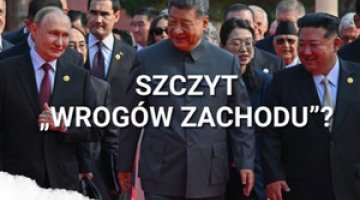Xi Jinping in Serbia: not just the economy
Co-author: Mateusz Seroka
On 17th - 19th June Xi Jinping made the first visit to Belgrade by a Chinese president in over 30 years . President Xi and Tomislav Nikolic signed a document which elevated the rank of co-operation between the two countries to an all-encompassing strategic partnership. A series of intergovernmental agreements were also signed with regard to economic, political and cultural co-operation. Among these was an agreement foreseeing a Chinese company undertaking the construction of a further Serbian section of a motorway linking Belgrade with the Montenegrin Adriatic. Contrary to what had been expected, agreements which would accelerate the delivery of the flagship Chinese-Serbian project of modernisation of the Serbian section of the Belgrade-Budapest railway were not concluded.
Commentary
- The visit has confirmed the suspicion that Serbia considers China to be its strategic partner, and one which is important not only because of the potential for economic co-operation. Beijing’s active support in preventing Kosovo from joining international organisations and UN agencies is crucial for Belgrade. Although EU integration remains the priority for the government in Belgrade, Serbia strongly emphasises that it has based its foreign policy on four pillars: the EU, Russia, the US and China. The rhetoric about maintaining strategic relations with global players enables the ruling right wing to present its independence and foreign policy ambitions to its voters.
- From China’s point of view, its relations with Serbia are important mainly because of the plan to construct a transport corridor between the Greek port of Piraeus and Central Europe. It is supposed to form a southern branch of the New Silk Road in the region. For this reason Serbia was appointed in 2014 to coordinate the area of infrastructure and transport under the 16+1 format (16 states from Central Eastern Europe plus China). So far there have been no results from this. Unlike its ties with the remaining countries in the region, China uses its contacts with Serbia in order to promote a tough stance regarding Taiwan’s independence and the dispute on the South China Sea over the delineation of maritime borders. This comes as part of China’s strategy of building political support among a large number of relatively small partners from developing countries.
- China is slowly increasing its importance in the Serbian economy. According to Serbian statistics, between 2005 and 2015 Serbia received 125 million euros in Chinese direct investments (under 1% of the total amount in investments at that time), with as much as 82 million euros in 2014. The Hebei Iron & Steel Company’s acquisition of a steel plant in Smederevo for 46 million euros was the largest investment in 2016. China is a relatively important trade partner for Serbia (8.5% of Serbia’s total imports in 2015), with a 1:80 trade deficit. Collaboration in terms of capital is developing dynamically; Serbian state-owned companies are intensively obtaining loans from China, which are usually tied to work being carried out by Chinese subcontractors. The state-owned company Elektroprivreda Srbije’s construction of a new unit in the coal-fuelled Kostolac power plant is the flagship project of this type. The power plant was granted as much as 608 million US dollars in a loan from China’s Eximbank; over half of the work with the plant is subcontracted to Chinese companies.





